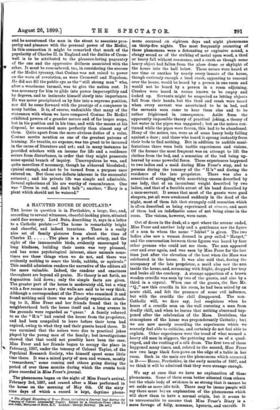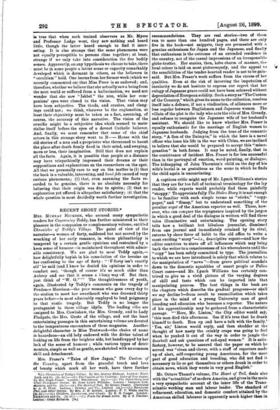A HAUNTED HOUSE IN SCOTLAND.* THE house in question is
in Perthshire, a large, fine, and, according to several witnesses, cheerful-looking place, situated amid fine scenery. Lord Bute, describing it, says in a letter to a Catholic prelate :—" The house is remarkably bright and cheerful, and indeed luxurious. There is a really nice set of family pictures from about the time of
Charles II. The place is a perfect aviary, and the sight of the innumerable birds, evidently encouraged by long kindness, building their nests was very pleasant, and has some psychological interest, since animals some- times see these things when we do not, and there was evidently nothing to scare the birds, rabbits, or squirrels." This candid admission renders the narrative of the editors all the more valuable. Indeed, the candour and exactness throughout are beyond all praise. No theory is set forth, no dogmatism laid down ; only the simple facts are given. The greater part of the house is moderately old, but a wing with a few rooms is new; the walls are said to be very thick. Although a correspondent of the Times who examined it and found nothing said there was no ghostly reputation attach- ing to it, Miss Freer and her friends found that in the neighbourhood both the house itself and a long avenue in the grounds were regarded as "queer." A family referred to as the " H.'s " had rented the house from the proprietor, and had been compelled to leave before their term had expired, owing to what they and their guests heard there. It was surmised that the noises were due to practical jokes played by the young men of the family; but investigations showed that that could not possibly have been the case. Miss Freer and her friends began to occupy the place in February, 1897, under the tenancy of Colonel Taylor, of the Psychical Research Society, who himself spent some little time there. It was a mixed party of men and women, mostly " researchers," some coming and others going during the period of over three months during which the events took place recorded in Miss Freer's journal.
The phenomena began on the night of Miss Freer's arrival, February 3rd, 1897, and ceased after a Mass performed in the house on the morning of May 6th. Of the sixty nine days of which a record is kept, daytime pheno-
• The Alleged Haunting of B— House, including a Journal kept during the Tenancy of Colonel Lemesurier Taylor. Edited by A. Goodrich-Freer (lass X) and John, Marquess of Bute, &T. London : George Redway. [2s. net.]
mena occurred on eighteen days and night phenomena on thirty-five nights. The most frequently occurring of these phenomena were a detonating or explosive sound, a clangy sound as of the striking of metal upon wood, a thud or heavy fall without resonance, and a crash as though some heavy object had fallen from the glass dome or skylight of the house into the hail below. These noises were heard at one time or another by nearly every inmate of the house, though curiously enough a loud crash, appearing to resound over the house, would be heard by a person in one room and would not be beard by a person in a room adjoining. Crashes were heard in rooms known to be empty and locked up. Servants might be suspected as letting objects fall from their hands, but the thud and crash were heard when every servant was ascertained to be in bed, and the servants soon came to hear them also and to be rather frightened in consequence. Aside from the apparently impossible theory of practical joking, a theory of hot water in the pipes was suggested ; but as the noises con- tinued while the pipes were frozen, this had to be abandoned. Many of the noises, too, were as of some heavy body falling against a door ; and those who heard it sprang instantly from their beds to find nothing. But in addition to audible mani- festations there were both tactile experiences and visions. Of the former the most frequent was an attempt to lift the clothes from the bed, and a sensation of the bed being up- heaved by some powerful force. These experiences happened to two ladies and a maid during Miss Freer's stay, and to persons during the tenancy of the " H.'s" and during the residence of the late proprietor. There was also a sensation of struggling with something unseen described by one lady, that of an incumbent weight described by two ladies, and that of a forcible arrest of his hand described by a man-servant. It seems that most of the guests were good sleepers, yet all were awakened suddenly in the dead of the night, most of them felt that strangely cold sensation which is often described as being experienced at seances, and most of them had an indefinable sense of not being alone in the room. The visions, however, were rarer.
Out of doors in the dusk, at a spot where the avenue ended, Miss Freer and another lady and a gentleman saw the figure of a nun to whom the name " Ishbel " is given. The two ladies also saw a woman dressed in grey called " Marget," and the conversation between these figures was heard by four other persons who could not see them. The nun appeared over and over again, and was seen by Miss Freer for the last time just after the elevation of the host when the Mass was celebrated in the house. It was also said that, during the occupancy of the late proprietor, a maid also saw the nun inside the house, and, screaming with fright, dropped her tray and broke all the crockery. A strange apparition of a brown wooden crucifix was seen by two of the guests, and also by a third in a crystal. When one of the guests, the Rev. Mr. "Q.," saw this crucifix in his room, he had been seized by an acute chill, and felt the presence of some evil influence, but with the crucifix the chill disappeared. The non- Catholic will, we dare say, feel suspicious when he hears of a crucifix seen on the wall restoring a man from deadly chill, and when he learns that nothing abnormal hap- pened after the celebration of the Mass. Doubtless, the atmosphere of the house was preponderantly Catholic ; but we are now merely recording the experiences which we scarcely feel able to criticise, and certainly do not feel able to explain. Other experiences were the tread of what seemed a heavy old man in slippers, the pattering noise as of a quad- ruped, and the rustling of a silk dress. The first two of these happened many times, and, related to the second, Miss Freer saw two large black fore-paws on the edge of a table in her room. Such in the main are the phenomena which occurred in B— House, Perthshire, in the early months of 1897, and we think it will be admitted that they were strange enough.
We say at once that we have no explanation of these phenomena. Some of them seem better attested than others but the whole body of evidence is so strong that it cannot be set aside as mere idle talk. There may be (some people will say there mast be) an explanation of the phenomena which will show them to have a normal origin, but it seems to us unreasonable to assume that Miss Freer's Diary is a mere farrago of folly, nonsense, hysteria, and untruth. It
is true that when such trained observers as Mr. Myers and Professor Lodge went, they saw nothing and heard little, though the latter heard enough to find it inter- esting. It is also strange that the same phenomena were not equally perceptible to persons close together; at least, strange if we only take into consideration the five bodily senses. Apparently, on any hypothesis we choose to take, there . must be in some people a latent sense or capacity remarkably developed which is dormant in others, as the believers in "occultism " hold. One learns from her former work (which we recently commented on) that Miss Freer is so endowed; and, therefore, whether we believe that she actually saw a being from the next world or suffered from a hallucination, we need not wonder that she saw "Ishbel " the nun, while her com- panions' eyes were closed to the vision. That vision may have been subjective. The thuds, and crashes, and clang- ings could not ; we think, whatever be the explanation, at least their objectivity must be taken as a fact, assuming, of course, the accuracy of this narrative. The vision of the crucifix might be a subjective idea which seemed to mate- rialise itself before the eyes of a devout Catholic believer. And, finally, we mast remember that some of the chief actors in this strange story went to B-- House with the old stories of a nun and a proprietor who threatened to haunt the place after death firmly fixed in their mind, and swaying, more or less, their imagination. Still that does not explain all the facts. Again, it is possible that people at a distance may have telepathically impressed their dreams or their suppositions and explanations on the researchers on the spot: All that we personally care to say on the matter is (1) that the book is a valuable, interesting, and bond fide record of very curious phenomena; (2) that, even assuming the facts re- corded to be genuine, there is no absolute necessity for believing that their origin was due to spirits ; (3) that no explanation yet offered is altogether satisfactory; (4) that the whole question is most decidedly worth further investigation.



































 Previous page
Previous page